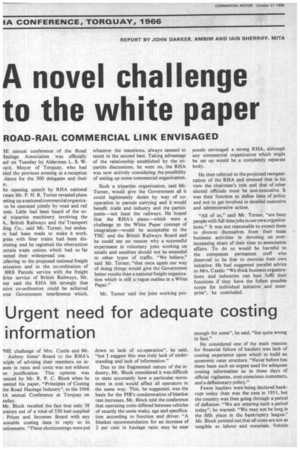A novel challenge to the white paper
Page 54

If you've noticed an error in this article please click here to report it so we can fix it.
ROAD-RAIL COMMERCIAL LINK ENVISAGED
iE annual conference of the Road -Iaulage Association was officially Led on Tuesday by Alderman L. S. W. ,ard, Mayor of Torquay, who had ided the previous evening at a reception dance for the 300 delegates and their s.
he opening speech by RHA national rman Mr. P. H. R. Turner revealed plans .etting up a national commercial organiz ato be operated jointly by road and rail .ests. Little had been heard of the sod tripartite machinery involving the A, British Railways and the' Transport ding Co., said Mr. Turner, but endears had been made to make it work. gress with liner trains had been disointing and he regretted the obstruction :.ertain trade unions which had so far rented their widespread use.
'..eferring to the proposed national freight mization and to the co-ordination of BRS Parcels service with the freight dries service of British Railways, Mr. ner said the RHA felt strongly that ctive co-ordination could be achieved lout Government interference which, whatever the intentions, always seemed to result in the second best. Taking advantage of the relationship established by the tripartite discussions, he went on, the RHA was now actively considering the possibility of setting up some commercial organization.
Such a tripartite organization, said Mr. Turner, would give the Government all it could legitimately desire by way of cooperation in parcels carrying and it would benefit trade and industry and the participants—not least the railways. He hoped that the RHA's plans—which were a challenge to the White Paper concept of integration—would be acceptable to the THC and the British Railways Board and he could see no reason why a successful experiment in voluntary joint working on smalls and sundries should not be extended to other types of traffic. "We believe," said Mr. Turner, "that once again our way of doing things would give the Government better results than a national freight organization which is still a vague outline in a White Paper."
Mr. Turner said the joint working pro
posals envisaged a strong RHA, although any commercial organization which might be set up would be a completely separate body.
He then referred to the projected reorganization of the RHA and stressed that in his view the chairman's role and that of other elected officials must be non-executive. It was their function to define lines of policy and not to get involved in detailed executive and administrative action.
"All ofus," said Mr. Turner, "are busy people with full-time jobs in our own organizations." It was not reasonable to expect them to divorce themselves from their main business activities in devoting an everincreasing share of their time to association affairs. To do so would be harmful to the competent permanent staff who deserved to be free to exercise their own initiative. He had suggested parallel advice to Mrs. Castle: "We think business organizations and industries can best fulfil their functions if they have the fullest possible scope for individual initiative and enterprise", he concluded.












































































































































